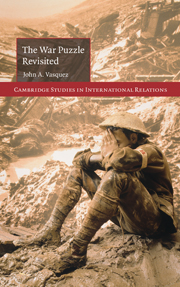Book contents
- Frontmatter
- Contents
- List of Figures
- List of Tables
- Preface
- Preface to the Original Text
- PART I Preliminaries
- Introduction
- 1 Conceptualizing War
- 2 Types of War
- 3 Power Politics and War
- Retrospective Commentary on Part I
- PART II The Onset and Expansion of Wars of Rivalry
- PART III Findings on the Steps to War, 1994–2008
- Appendix I A Propositional Summary
- Appendix II Major Findings on the Steps to War
- References
- Index
- CAMBRIDGE STUDIES IN INTERNATIONAL RELATIONS
3 - Power Politics and War
Published online by Cambridge University Press: 05 June 2012
- Frontmatter
- Contents
- List of Figures
- List of Tables
- Preface
- Preface to the Original Text
- PART I Preliminaries
- Introduction
- 1 Conceptualizing War
- 2 Types of War
- 3 Power Politics and War
- Retrospective Commentary on Part I
- PART II The Onset and Expansion of Wars of Rivalry
- PART III Findings on the Steps to War, 1994–2008
- Appendix I A Propositional Summary
- Appendix II Major Findings on the Steps to War
- References
- Index
- CAMBRIDGE STUDIES IN INTERNATIONAL RELATIONS
Summary
The price of world power is death
Power politics behavior is a series of steps to war, not to peace. It is one of the great contradictions of the history of the modern global system that while the theory of power politics has been offered as the only realistic path to attain and secure peace, the practices of power politics have been associated with the outbreak of war. Power politics or realpolitik behavior may be defined as actions based on an image of the world as insecure and anarchic which leads to distrust, struggles for power, interest taking precedence over norms and rules, the use of Machiavellian stratagems, coercion, attempts to balance power, reliance on self-help, and the use of force and war as the ultima ratio (Vasquez, 1983a: 216).
Power politics behavior should be distinguished from power politics theory or realism, which is an abstract body of generalizations and prescriptions derived from and intended to shape practices in the world. Much of the difficulty in creating a scientific study of world politics has stemmed from the failure to understand where power politics theory has come from, the role it has played in history, and how it both reflects and helped to create the historical conditions we have inherited. Power politics is not so much an explanation of world politics, as it is a form of behavior that must itself be explained (see Vasquez, 1983a: 215ff). Power politics theory is not simply a perspective on history, but a datum of history that should be subjected to scientific analysis.
- Type
- Chapter
- Information
- The War Puzzle Revisited , pp. 90 - 127Publisher: Cambridge University PressPrint publication year: 2009

